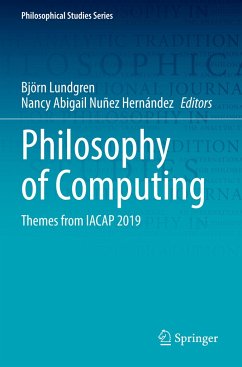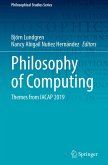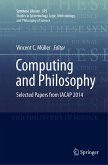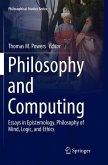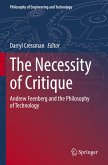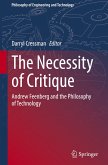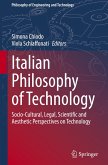Philosophy of Computing
Themes from IACAP 2019
Herausgegeben:Lundgren, Björn; Nuñez Hernández, Nancy Abigail
Philosophy of Computing
Themes from IACAP 2019
Herausgegeben:Lundgren, Björn; Nuñez Hernández, Nancy Abigail
- Broschiertes Buch
- Merkliste
- Auf die Merkliste
- Bewerten Bewerten
- Teilen
- Produkt teilen
- Produkterinnerung
- Produkterinnerung
This book features a unique selection of works presented at the 2019 annual international conference of the International Association for Computing and Philosophy (IACAP). Every contribution has been peer-reviewed, revised, and extended. The included chapters are thematically diverse; topics include epistemology, dynamic epistemic logic, topology, philosophy of science and computation, game theory and abductive inferences, automated reasoning and mathematical proofs, computer simulations, scientific modelling, applied ethics, pedagogy, human-robot interactions, and big data, algorithms, and…mehr
Andere Kunden interessierten sich auch für
![Philosophy of Computing Philosophy of Computing]() Philosophy of Computing119,99 €
Philosophy of Computing119,99 €![Computing and Philosophy Computing and Philosophy]() Computing and Philosophy75,99 €
Computing and Philosophy75,99 €![Philosophy and Computing Philosophy and Computing]() Philosophy and Computing82,99 €
Philosophy and Computing82,99 €![The Necessity of Critique The Necessity of Critique]() The Necessity of Critique75,99 €
The Necessity of Critique75,99 €![The Necessity of Critique The Necessity of Critique]() The Necessity of Critique75,99 €
The Necessity of Critique75,99 €![Italian Philosophy of Technology Italian Philosophy of Technology]() Italian Philosophy of Technology90,99 €
Italian Philosophy of Technology90,99 €![Italian Philosophy of Technology Italian Philosophy of Technology]() Italian Philosophy of Technology90,99 €
Italian Philosophy of Technology90,99 €-
-
-
This book features a unique selection of works presented at the 2019 annual international conference of the International Association for Computing and Philosophy (IACAP). Every contribution has been peer-reviewed, revised, and extended. The included chapters are thematically diverse; topics include epistemology, dynamic epistemic logic, topology, philosophy of science and computation, game theory and abductive inferences, automated reasoning and mathematical proofs, computer simulations, scientific modelling, applied ethics, pedagogy, human-robot interactions, and big data, algorithms, and artificial intelligence.
The volume is a testament to the value of interdisciplinary approaches to the computational and informational turn. We live in a time of tremendous development, which requires rigorous reflection on the philosophical nature of these technologies and how they are changing the world. How can we understand these technologies? How do these technologies change our understanding of the world? And how do these technologies affect our place as humans in the world? These questions, and more, are addressed in this volume which is of interest to philosophers, engineers, and computer scientists alike.
The volume is a testament to the value of interdisciplinary approaches to the computational and informational turn. We live in a time of tremendous development, which requires rigorous reflection on the philosophical nature of these technologies and how they are changing the world. How can we understand these technologies? How do these technologies change our understanding of the world? And how do these technologies affect our place as humans in the world? These questions, and more, are addressed in this volume which is of interest to philosophers, engineers, and computer scientists alike.
Produktdetails
- Produktdetails
- Philosophical Studies Series 143
- Verlag: Springer / Springer International Publishing / Springer, Berlin
- Artikelnr. des Verlages: 978-3-030-75269-9
- 1st edition 2022
- Seitenzahl: 272
- Erscheinungstermin: 6. Mai 2023
- Englisch
- Abmessung: 235mm x 155mm x 14mm
- Gewicht: 467g
- ISBN-13: 9783030752699
- ISBN-10: 3030752690
- Artikelnr.: 67752078
- Herstellerkennzeichnung
- Springer-Verlag GmbH
- Tiergartenstr. 17
- 69121 Heidelberg
- ProductSafety@springernature.com
- Philosophical Studies Series 143
- Verlag: Springer / Springer International Publishing / Springer, Berlin
- Artikelnr. des Verlages: 978-3-030-75269-9
- 1st edition 2022
- Seitenzahl: 272
- Erscheinungstermin: 6. Mai 2023
- Englisch
- Abmessung: 235mm x 155mm x 14mm
- Gewicht: 467g
- ISBN-13: 9783030752699
- ISBN-10: 3030752690
- Artikelnr.: 67752078
- Herstellerkennzeichnung
- Springer-Verlag GmbH
- Tiergartenstr. 17
- 69121 Heidelberg
- ProductSafety@springernature.com
Björn Lundgren obtained a doctoral degree in philosophy in 2018 at the Royal Institute of Technology (Stockholm, Sweden). He is currently working as a researcher at Utrecht University (Utrecht, The Nederlands), as part of a research program on Ethics of socially disruptive technologies (Esdit). Lundgren mainly works on topics such as AI; self-driving vehicles; privacy and anonymity; risk, safety, and security; and information. You can find his recent works in journals such as AI & Society, Journal of Ethics, Journal of Ethics and Social Philosophy, Philosophy & Technology, Res Publica, Risk Analysis, Science & Engineering Ethics, and Synthese. Nancy Abigail Nuñez Hernández obtained a doctoral degree in philosophy in 2017 at the National Autonomous University of Mexico (Mexico City, Mexico). She is currently working as a researcher at the Institute of Philosophy of the Czech Academy of Sciences (Prague, Czech Republic). She is also a member of the National System of Researchers of Mexico (CONACYT). Nuñez Hernández mainly works on epistemology, philosophical logic, and philosophy of computer science and mathematics. She was a member of the local organizing committee of the 2019 IACAP Conference.
Distributed computation and epistemic logic.- 1. "You will never know": The topology of surprise, Alexandru Baltag.- 2. Distributed computing, epistemic logic and topology, Sergio Rajsbaum.- 3. Distributed Computing with Bounded Rational Agents, Armando Castañeda.- 4. Topological Models of Group Knowledge, Aldo Iván Ramírez-Abarca.- 5. Logic and Computation of Social Behavior, Sonja Smets.- 6. Stratified evidence logic, David Fernández-Duque.- 7. Reliability-based preference dynamics, Fernando Velázquez-Quesada.- 8. A Dynamic Logic for Learning Theory, Ana Lucia Vargas-Sandoval.- 9. Engineering distributed systems: how efficient is a computational model?, Alice.- Martin and Mathieu Magnaudet.- 10. Some phenomenological considerations in computational modeling of analogy,.- Eduardo García-Mendiola.- 11. Underdetermination after Computation, Don Berkich.- Philosophy of science and computation.- 1. Epistemology of Computer Simulations, Juan M. Duran.- 2. Inappropriate Notions of 'Theory' and their Practical Consequences in the Discipline.- of Software 'Engineering', Stefan Gruner.- 3. Mathematical Explanation and the Problem of Counterpossibles, Erlantz Etxeberria.- 4. Meta-Abduction. Inference to the Best Prediction, Christian J. Feldbacher Escamilla.- 5. Causal judgments and model implementation, Tomasz Wysocki.- 6. The Epiphenomenal Puzzle and the Formal Conception of Computational Dynamics,.- Mauricio Eduardo Bieletto Bueno.- 7. On the Conciliation of Traditional and Computer-Assisted Proofs, Lourdes Del.- Carmen González Huesca and Favio Ezequiel Miranda Perea.- 8. How Artificial is Data?, Robin Hill.- 9. On Computer Simulations, with particular Regard to their Application in.- Contemporary Astrophysics: some SciencePhilosophical Considerations, Stefan.- Gruner and Matthias Bartelmann.- 10. Lighthill's Anti Formalist Falsification of AI in Philosophical Context, Steven Meyer.- 11. Implementing algorithmic and computational design in philosophical pedagogy,.- Rocco Gangle.- 12. Is there anything special about the type of defectiveness involved in Big Data?: Some.- reflections on ignorance and Astrophysics, Maria Del Rosario Martinez Ordaz.- 13. The birth of Evil Genius, Mauricio Algalan-Meneses.- Computation and cognition.- 1. Integrating computation into the mechanistic hierarchy in the cognitive and neural.- science, Oron Shagrir and Lotem ElberDorozko.- 2. Types, Tokens and Turing Tests, Paul Schweizer.- 3. Fixed-parameter tractability of cognitive capacities and the usefulness of deductive.- reasoning, Nancy Abigail Nuñez Hernández.- 4. Boundedly Rational Concept Formation, David Abel and Mark Ho.- 5.Inferential Knowledge and Knowledge Representation, Yves Bouchard.- 6. Logic and Heuristics in Cognitive Psychology and Computational Sciences: Friends.- or Enemies?, Karen Gonzalez-Fernandez.- Ethical themes on artificial intelligence and robotics.- 1. Our Technology Fetish, John Weckert.- 2. AI-Driven Behavior Change and the Parameters of Ethical Permissibility, Fiona.- McEvoy.- 3. Self-driving Cars: An Ethical Overview, Björn Lundgren.- 4. Machiavellian Machines: Glitching AI, Steve T. McKinlay.- 5. Artificial Intelligence, Transparency, and Public Decision-Making - Why we should.- opt for explaining AI assistants, Karl de Fine Licht and Jenny de Fine Licht.- 6. Predictive Fairness, Anders Herlitz.- 7. Misdirection in Robot Teams: Methods and Ethical Considerations, Ronald Arkin.- 8. Creating Moral Ideals in AI through Buddhist Principles, Angelica Fleury.- 9. Kantian one day, Consequentialistthe next: Moral emotions as mediators between.- ethical frameworks for robots, Alan Wagner, Jason Borenstein and Ronald Arkin.- 10. The Aristotelian Robot, Eduardo Mendieta and Alan Wagner.- 11. Castigation by Robot: Should Robots be Allowed to Punish Us?, Himavath Jois and.- Alan Wagner.- 12. Ethics and New Epistemology of Artificial Intelligence and Big Data, Ricardo Vigueras.
Distributed computation and epistemic logic.- 1. "You will never know": The topology of surprise, Alexandru Baltag.- 2. Distributed computing, epistemic logic and topology, Sergio Rajsbaum.- 3. Distributed Computing with Bounded Rational Agents, Armando Castañeda.- 4. Topological Models of Group Knowledge, Aldo Iván Ramírez-Abarca.- 5. Logic and Computation of Social Behavior, Sonja Smets.- 6. Stratified evidence logic, David Fernández-Duque.- 7. Reliability-based preference dynamics, Fernando Velázquez-Quesada.- 8. A Dynamic Logic for Learning Theory, Ana Lucia Vargas-Sandoval.- 9. Engineering distributed systems: how efficient is a computational model?, Alice.- Martin and Mathieu Magnaudet.- 10. Some phenomenological considerations in computational modeling of analogy,.- Eduardo García-Mendiola.- 11. Underdetermination after Computation, Don Berkich.- Philosophy of science and computation.- 1. Epistemology of Computer Simulations, Juan M. Duran.- 2. Inappropriate Notions of 'Theory' and their Practical Consequences in the Discipline.- of Software 'Engineering', Stefan Gruner.- 3. Mathematical Explanation and the Problem of Counterpossibles, Erlantz Etxeberria.- 4. Meta-Abduction. Inference to the Best Prediction, Christian J. Feldbacher Escamilla.- 5. Causal judgments and model implementation, Tomasz Wysocki.- 6. The Epiphenomenal Puzzle and the Formal Conception of Computational Dynamics,.- Mauricio Eduardo Bieletto Bueno.- 7. On the Conciliation of Traditional and Computer-Assisted Proofs, Lourdes Del.- Carmen González Huesca and Favio Ezequiel Miranda Perea.- 8. How Artificial is Data?, Robin Hill.- 9. On Computer Simulations, with particular Regard to their Application in.- Contemporary Astrophysics: some SciencePhilosophical Considerations, Stefan.- Gruner and Matthias Bartelmann.- 10. Lighthill's Anti Formalist Falsification of AI in Philosophical Context, Steven Meyer.- 11. Implementing algorithmic and computational design in philosophical pedagogy,.- Rocco Gangle.- 12. Is there anything special about the type of defectiveness involved in Big Data?: Some.- reflections on ignorance and Astrophysics, Maria Del Rosario Martinez Ordaz.- 13. The birth of Evil Genius, Mauricio Algalan-Meneses.- Computation and cognition.- 1. Integrating computation into the mechanistic hierarchy in the cognitive and neural.- science, Oron Shagrir and Lotem ElberDorozko.- 2. Types, Tokens and Turing Tests, Paul Schweizer.- 3. Fixed-parameter tractability of cognitive capacities and the usefulness of deductive.- reasoning, Nancy Abigail Nuñez Hernández.- 4. Boundedly Rational Concept Formation, David Abel and Mark Ho.- 5.Inferential Knowledge and Knowledge Representation, Yves Bouchard.- 6. Logic and Heuristics in Cognitive Psychology and Computational Sciences: Friends.- or Enemies?, Karen Gonzalez-Fernandez.- Ethical themes on artificial intelligence and robotics.- 1. Our Technology Fetish, John Weckert.- 2. AI-Driven Behavior Change and the Parameters of Ethical Permissibility, Fiona.- McEvoy.- 3. Self-driving Cars: An Ethical Overview, Björn Lundgren.- 4. Machiavellian Machines: Glitching AI, Steve T. McKinlay.- 5. Artificial Intelligence, Transparency, and Public Decision-Making - Why we should.- opt for explaining AI assistants, Karl de Fine Licht and Jenny de Fine Licht.- 6. Predictive Fairness, Anders Herlitz.- 7. Misdirection in Robot Teams: Methods and Ethical Considerations, Ronald Arkin.- 8. Creating Moral Ideals in AI through Buddhist Principles, Angelica Fleury.- 9. Kantian one day, Consequentialistthe next: Moral emotions as mediators between.- ethical frameworks for robots, Alan Wagner, Jason Borenstein and Ronald Arkin.- 10. The Aristotelian Robot, Eduardo Mendieta and Alan Wagner.- 11. Castigation by Robot: Should Robots be Allowed to Punish Us?, Himavath Jois and.- Alan Wagner.- 12. Ethics and New Epistemology of Artificial Intelligence and Big Data, Ricardo Vigueras.

